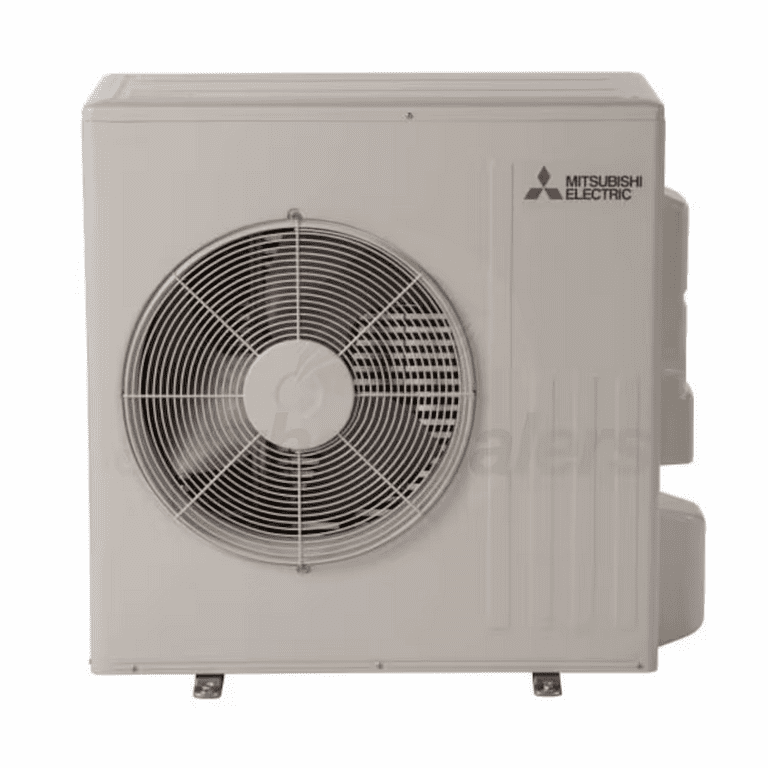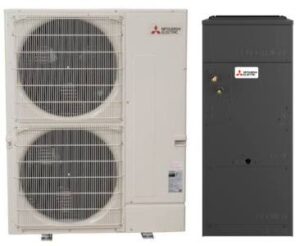Are you looking to upgrade your home’s heating and cooling system? Choosing the right heat pump can make all the difference in comfort and energy efficiency.
If you’ve narrowed down your options to the M Series and P Series Mitsubishi heat pumps, you’re on the right track. These two series offer unique features and benefits, but deciding which one is best for your home can be tricky.
Don’t worry, you’re not alone in this decision-making process. We’ll break down the key differences between the M Series and P Series Mitsubishi heat pumps, helping you make an informed choice that suits your home and lifestyle perfectly. Stay with us to discover which series could transform your comfort levels and possibly even reduce your energy bills.
M Series Features
The Mitsubishi M Series heat pump is a powerhouse designed for residential comfort. If you’re considering upgrading your home’s heating and cooling system, understanding the M Series features can help you make an informed decision. Let’s dive into what makes the M Series stand out.
Performance And Efficiency
The M Series is renowned for its impressive performance and high efficiency. With advanced inverter technology, these units adjust power usage dynamically, providing consistent temperatures while minimizing energy consumption. Imagine having a heat pump that intelligently adapts to your home’s needs, saving you money on utility bills. Have you ever wondered how much energy your current system wastes?
Design And Aesthetics
Mitsubishi’s M Series offers sleek and modern designs that blend seamlessly into any home decor. These units are not just functional but also visually appealing. They come in various sizes and styles to match your aesthetic preferences. Picture a unit that complements your living space rather than detracting from it. Wouldn’t you prefer a system that adds to the look of your home?
Installation And Maintenance
Installing an M Series heat pump is straightforward, often requiring minimal disruption to your home. Professional installation ensures optimal performance and longevity. Regular maintenance is simple, with easy-to-access filters and components that keep your system running smoothly. Have you considered how hassle-free maintenance can enhance your home comfort? Keeping your system in top shape shouldn’t be a chore.
P Series Features
The P Series Mitsubishi Heat Pump stands out with its advanced features. It caters to both residential and commercial spaces, offering reliability and comfort. Designed for efficiency, it ensures optimal performance in various climates.
Performance And Efficiency
Experience superior energy efficiency with the P Series. It boasts high SEER ratings, minimizing energy costs. The heat pump maintains consistent temperatures, ensuring year-round comfort. Its inverter technology adapts to changing conditions, offering precise control.
Design And Aesthetics
The P Series showcases sleek and modern designs. It fits seamlessly into any space, enhancing aesthetics. The units are compact, saving valuable space. With quiet operation, they blend into your environment without disturbance.
Installation And Maintenance
Installing the P Series is straightforward, reducing setup time. Its user-friendly interface simplifies operation. Regular maintenance is easy, ensuring long-lasting performance. Durable components minimize the need for frequent repairs, offering peace of mind.
Cost Comparison
When choosing a Mitsubishi heat pump, cost is a major consideration. Both the M Series and P Series offer unique benefits. Understanding their cost differences helps in making an informed decision. Let’s dive into the cost comparison between these two popular series.
Upfront Costs
The initial cost of the M Series is usually lower. It’s designed for residential use, making it budget-friendly. The P Series, tailored for commercial spaces, tends to be pricier. Its advanced features and robust performance justify the higher price. Installation costs for both vary based on setup requirements. But typically, M Series installations are simpler and cheaper.
Long-term Savings
Long-term savings might sway your decision. The M Series offers good energy efficiency. This results in noticeable reductions in energy bills. The P Series, though costlier initially, can lead to even greater savings. Its high efficiency suits larger spaces needing consistent climate control. Over time, these savings can offset the initial investment. Both series promise durability, reducing the need for frequent replacements.
Energy Efficiency
Choosing between the M Series and P Series Mitsubishi Heat Pumps can be challenging. Energy efficiency plays a vital role in this decision. Heat pumps offer sustainable solutions for heating and cooling. Understanding their efficiency helps make informed choices.
Seer Ratings
SEER stands for Seasonal Energy Efficiency Ratio. It measures cooling efficiency. The M Series offers high SEER ratings. This means better energy savings. The P Series also boasts impressive SEER ratings. Both series provide efficient cooling solutions. Higher SEER ratings indicate less energy consumption. This translates to lower utility bills. Comparing SEER ratings helps in assessing efficiency.
Environmental Impact
Heat pumps reduce carbon footprints. The M Series is designed with eco-friendly technology. It minimizes environmental impact. The P Series also focuses on sustainability. Both series use refrigerants with lower global warming potential. This contributes to a greener planet. The efficient operation reduces greenhouse gas emissions. Choosing either series supports environmental conservation. Consider their environmental benefits when deciding.
User Experience
The user experience of heat pumps can significantly impact satisfaction. Both Mitsubishi’s M Series and P Series offer unique features and benefits. Understanding these differences helps consumers make informed decisions.
Customer Reviews
Customer reviews often highlight key aspects of the user experience. For the M Series, users praise its reliability and efficiency. Many appreciate its quiet operation and consistent temperature control.
In contrast, P Series users often mention its advanced features. They value the enhanced climate control and customizable settings. Reviews frequently note its ability to handle extreme weather conditions.
Ease Of Use
Ease of use is crucial for any heat pump. The M Series provides straightforward installation and maintenance. Its intuitive controls make it easy for users to adjust settings.
The P Series offers advanced technology with simplified usability. It features user-friendly interfaces and smart technology integration. This makes managing indoor climate effortless for many homeowners.

Credit: www.youtube.com
Technical Specifications
Understanding the technical specifications of Mitsubishi’s M Series and P Series heat pumps can be crucial in making the right choice for your home or business. You might be wondering how these specs translate into real-world performance. Let’s dive into the specifics and see what each series offers.
Capacity And Power
When considering heat pumps, capacity and power are vital. The M Series models generally offer a capacity range that suits residential needs, from smaller spaces to medium-sized homes. The P Series steps it up, designed for larger areas or commercial spaces with higher capacity demands.
Think about the size of your area. An M Series might be perfect for your living room, while a P Series could cover an entire office floor efficiently. Both series ensure powerful heating and cooling, but the key is matching the capacity to your space.
Noise Levels
No one likes a noisy appliance. You want comfort, not a constant hum. The M Series is known for quieter operation, making it ideal for bedrooms and living spaces where peace is valued.
On the other hand, the P Series, while slightly louder due to its higher power, is still engineered to minimize noise. Consider where you’ll place your heat pump. If it’s near a workspace or a quiet zone, the M Series might be the better choice.
Imagine relaxing at home or focusing at work without distraction. Which series aligns with your noise tolerance? Remember, peace of mind often comes with a quieter machine.
Are you prioritizing capacity or noise levels? These specifications can guide you to the perfect heat pump choice. Reflect on your needs and environment to make an informed decision.
Suitability For Different Climates
The Mitsubishi Heat Pumps are known for their efficiency and versatility. The M Series and P Series both excel in different climates. Understanding their suitability for various climates helps in making the right choice.
Cold Climate Performance
The P Series Mitsubishi Heat Pump handles cold climates efficiently. It works well in freezing temperatures. This series offers consistent heating, even in harsh winters. The advanced technology ensures comfort without high energy costs. The M Series also performs well in cold areas. Yet, it might need extra support during extreme cold spells.
Hot Climate Performance
The M Series excels in hot climates. It efficiently cools spaces during scorching summers. This series ensures a comfortable indoor environment. It uses less energy, saving on electricity bills. The P Series also cools well but is more suited for mixed climates. Both models provide reliable performance. Choose based on your climate needs and comfort preferences.

Credit: www.walmart.com
Warranty And Support
Choosing the right heat pump involves understanding the warranty and support options. These aspects ensure peace of mind and reliability over the years. Let’s explore how the M Series and P Series Mitsubishi Heat Pumps fare in this regard.
Warranty Terms
The M Series Mitsubishi Heat Pump offers a limited warranty. It typically covers parts and labor for a certain period. This warranty provides security against manufacturing defects. The P Series has a similar warranty structure. It often includes extended coverage for parts. Understanding warranty terms helps in making an informed decision.
Customer Support Services
Effective customer support ensures timely assistance. The M Series offers robust support services. Customers can contact experts for troubleshooting and advice. The P Series also provides excellent support services. Access to knowledgeable staff enhances user experience. Both series aim to resolve issues efficiently.

Credit: www.element-hvac.com
Frequently Asked Questions
What Is The Difference Between M Series And P Series?
M Series is for homes, offering quiet operation. P Series suits commercial spaces, providing robust performance.
Which Mitsubishi Heat Pump Is More Energy Efficient?
M Series is generally more energy efficient. It’s designed for residential use, focusing on low energy consumption.
Is The P Series Suitable For Small Spaces?
Yes, but it’s ideal for larger areas. It has powerful heating and cooling for commercial environments.
Can M Series Handle Extreme Weather Conditions?
Yes, M Series can perform in cold and hot climates. It’s built for various weather conditions.
How Does Installation Differ Between The Two Series?
M Series installation is simpler and quicker. P Series may require professional installation for optimal performance.
Conclusion
Choosing between the M Series and P Series Mitsubishi Heat Pumps can be tough. Both have strengths. M Series suits smaller spaces with limited needs. It’s compact and efficient. P Series handles larger areas and more demanding conditions. It offers robust performance and durability.
Budget plays a role in decision-making too. Consider your specific needs and environment. This ensures the best choice. Investing in the right heat pump maximizes comfort and efficiency. Make an informed decision for lasting satisfaction and savings.
